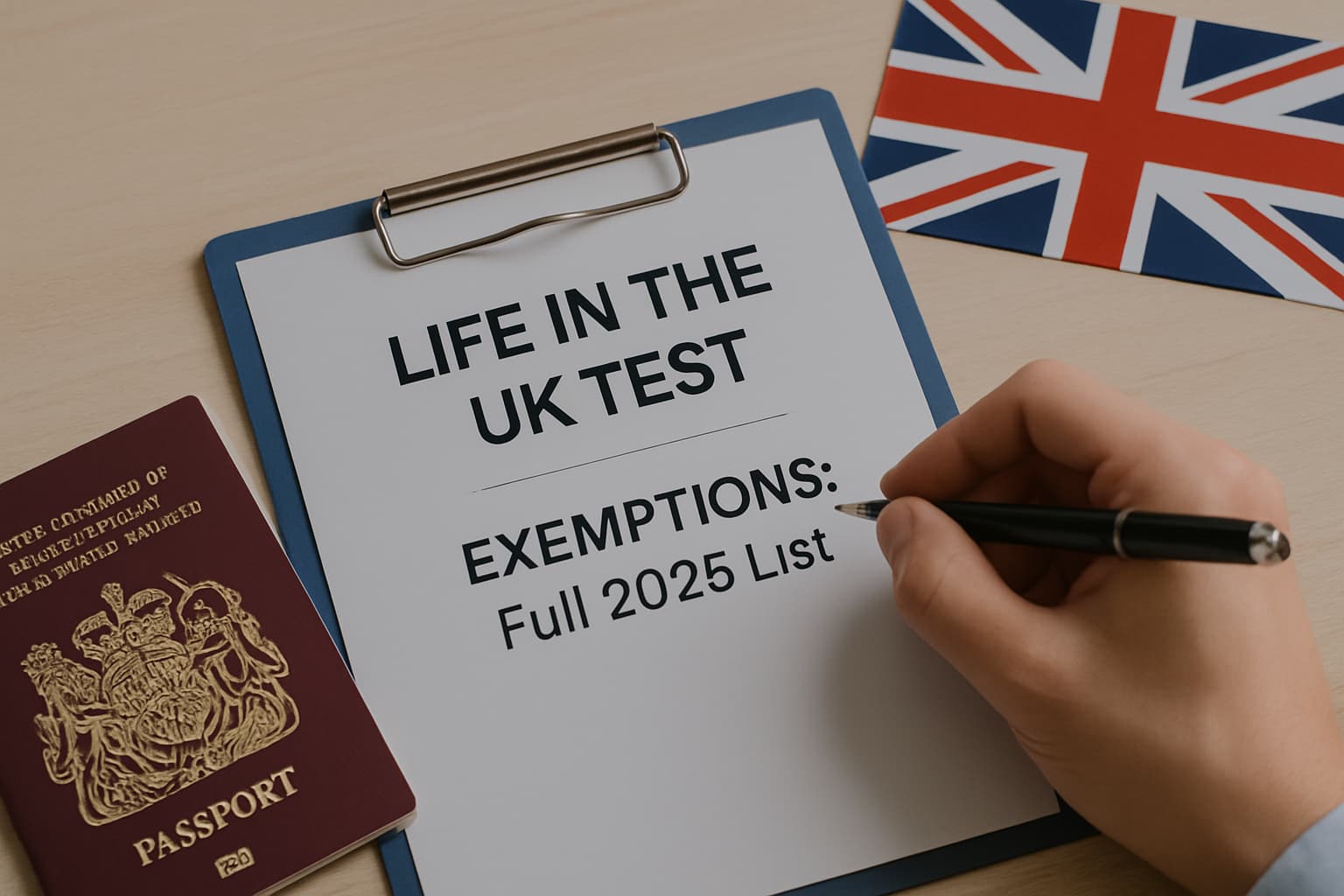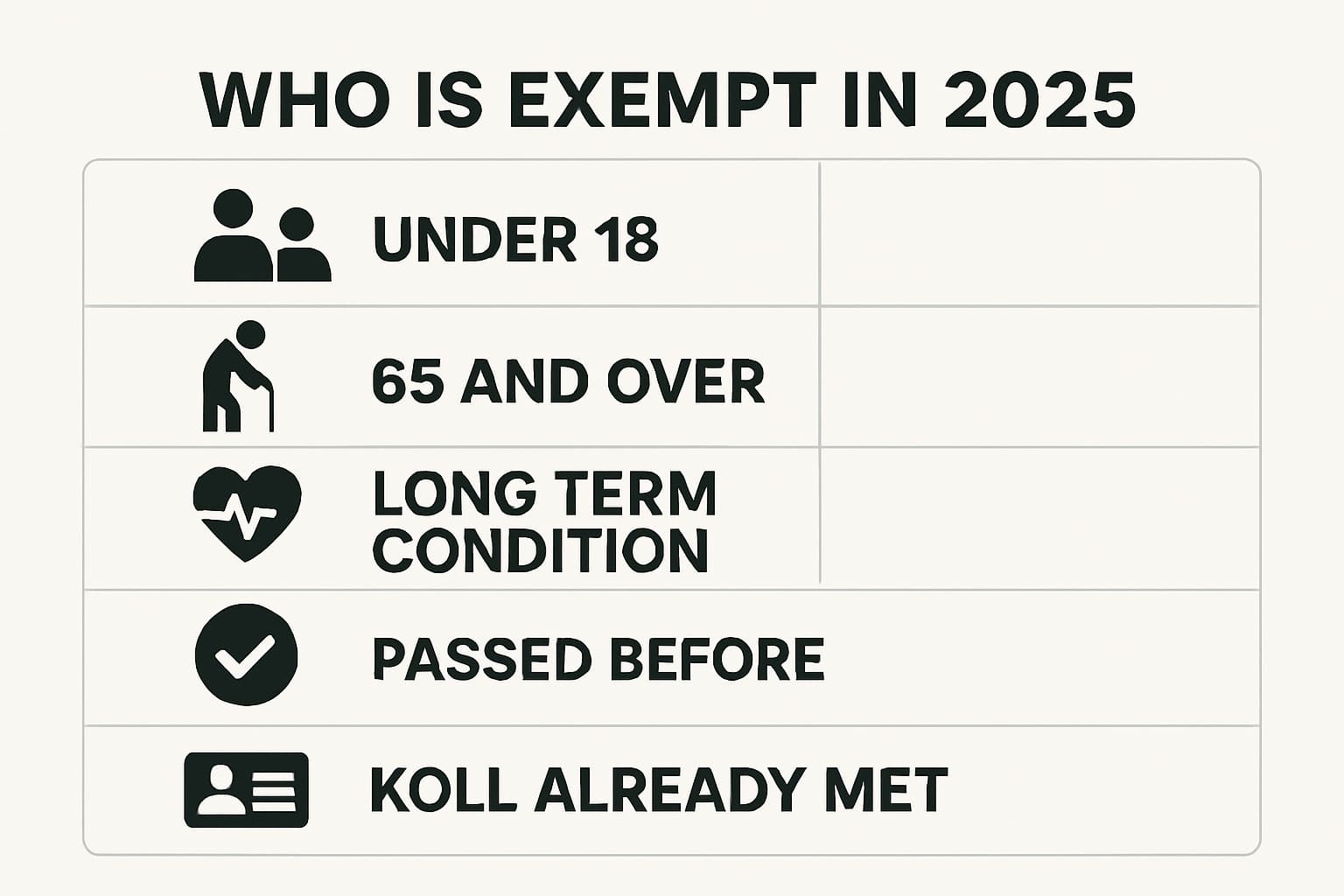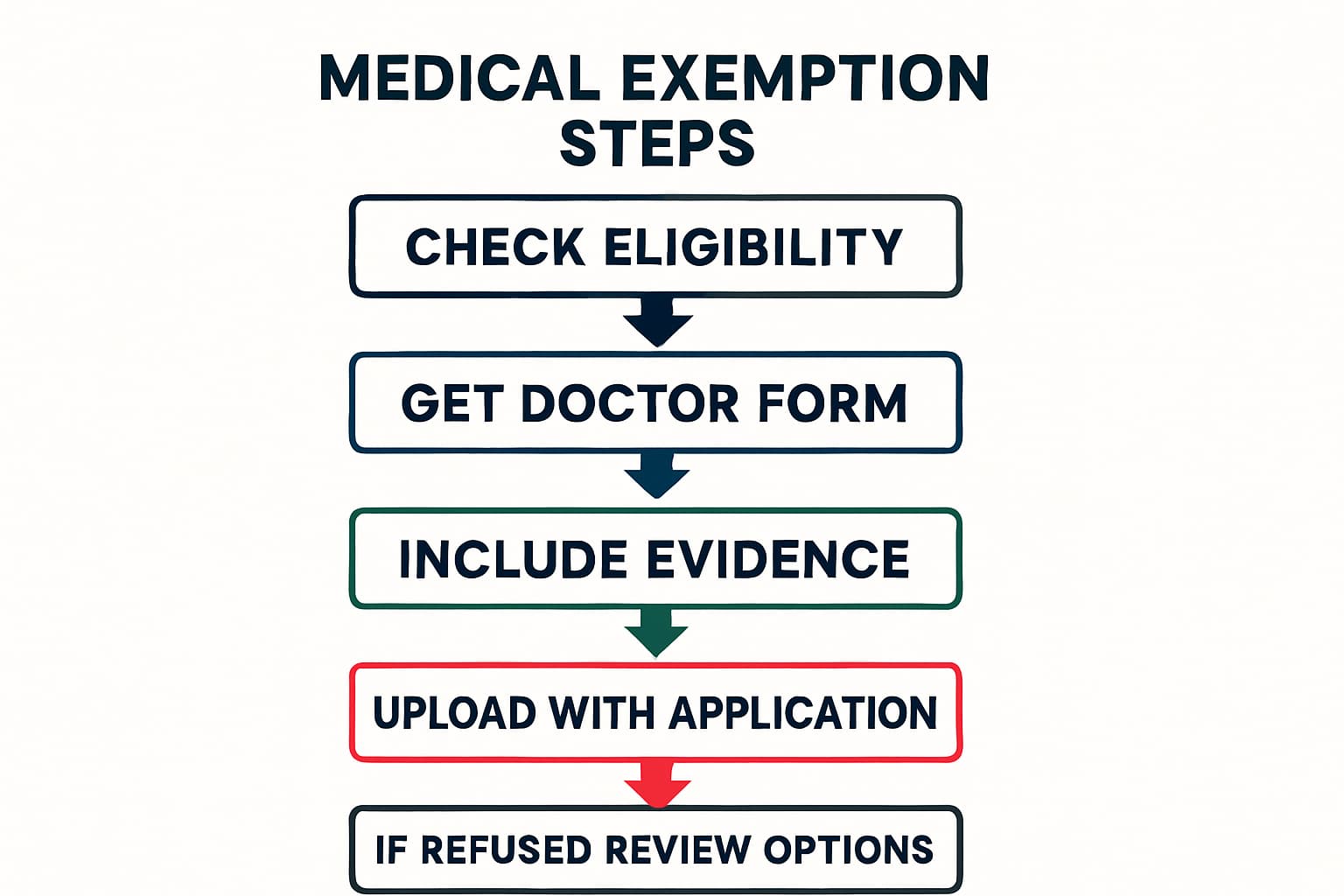Life in the UK Test Exemptions: Full 2025 List

Worried you might not need the Life in the UK Test? This guide shows exactly who is exempt in 2025 and how to claim an exemption correctly.
We’ll cover every exemption category, what applies to ILR and citizenship, what does NOT count, step-by-step medical waiver instructions, a 60‑second decision tree, and a quick documents checklist. If you’re not exempt, you’ll also get a 7–14 day plan to pass first time.
At a glance: Who is exempt from the Life in the UK Test in 2025?
- Age: Under 18, or 65 and over (for ILR and citizenship).
- Medical: A long-term physical or mental condition that prevents preparing for and/or taking the test, supported by medical evidence.
- Already passed: You can reuse a previous pass; it does not expire.
- KOLL already met: If you satisfied Knowledge of Language and Life (KOLL) when you got ILR after 28 Oct 2013, you typically won’t need to re-take the test for citizenship.
- Children registering as British: Children applying for citizenship by registration are exempt.
- Rare discretion: Exceptional compassionate circumstances may lead to a waiver (uncommon and evidence-heavy).
Official guidance: see GOV.UK Life in the UK Test and Home Office KOLL guidance.

The complete list of Life in the UK Test exemptions (2025)
Use this quick table, then read the short explanations below.
| Exemption | ILR | Citizenship |
|---|---|---|
| Age: Under 18 | Exempt | Exempt |
| Age: 65 and over | Exempt | Exempt |
| Medical: Long-term condition | Possible exemption (with evidence) | Possible exemption (with evidence) |
| Already passed the test | Re-use pass | Re-use pass |
| KOLL met at ILR (post 28 Oct 2013) | — | Usually no need to re-take |
| Children registering as British | — | Exempt |
Age-based exemption: under 18 or 65 and over
If you’re under 18 or 65+ on the date of your application, you’re exempt from the KOLL requirement (which includes the Life in the UK Test) for both ILR and naturalisation. Caseworkers must waive it for applicants 65+.
Sources: Home Office KOLL guidance, GOV.UK.
Medical exemption: a long-term physical or mental condition
You may be exempt if you have a long-term condition that prevents you from learning/preparing for the test and/or sitting it. You must submit the official medical exemption form (or a detailed letter) from a UK-registered medical practitioner confirming diagnosis, functional impact, and that the condition is unlikely to change soon.
Sources: GOV.UK exemption form, KOLL caseworker PDF, Citizens Advice.
Already passed the Life in the UK Test: reuse your pass, no expiry
Once you pass, your result does not expire. You can reuse it for future ILR or citizenship applications. GOV.UK confirms you do not need to take it again if you’ve passed before (for example, at ILR stage when later applying for citizenship).
Learn more: How long is the Life in the UK Test valid? and GOV.UK.
You already met KOLL when you got ILR after 28 Oct 2013
If you met KOLL for ILR on or after 28 October 2013 (the date the requirement changed), you would typically not need to re-take the Life in the UK Test when applying for British citizenship. Always check your individual circumstances against the latest Home Office guidance.
Reference: KOLL guidance.
ILR routes that do not require the Life in the UK Test (e.g., EU Settlement Scheme)
Some settlement routes, such as settled status under the EU Settlement Scheme (EUSS), do not require KOLL for ILR. However, if you later apply for citizenship, the Life in the UK Test is still required unless you’re exempt by age or medical reasons.
Related reading: Life in the UK Test for ILR: Do You Really Need It in 2025?
Children applying for British citizenship (registration) are exempt
Children registering as British citizens do not need to take the Life in the UK Test. The KoLL requirement applies to adult naturalisation and most adult ILR routes.
Rare discretionary waivers for exceptional compassionate circumstances
The Home Office may exercise discretion in exceptional cases (for example, severe, documented barriers to learning or communication). These waivers are uncommon and rely on detailed, credible evidence, often supported by medical professionals. For applicants aged 60–64, discretion may apply if evidence shows you’re unlikely to meet the requirement before turning 65.
Exemptions vs alternatives: what does NOT count as an exemption
- English language (B1 or degree in English) is separate. Meeting the English requirement does not replace the Life in the UK Test. See our guide: Life in the UK Test and B1: Do You Need Both in 2025?
- Pregnancy, temporary illness, test anxiety: Not automatic exemptions. Only long-term conditions supported by medical evidence qualify for a waiver. You can request reasonable adjustments when booking.
- Religious reasons or distance to a test centre: Not valid exemptions. Consider travelling to an approved centre or rescheduling.
- Disability alone does not equal exemption: Many centres can accommodate a variety of disabilities; you may still be able to take the test with adjustments.
How to claim a medical exemption correctly (step-by-step)
Check eligibility: what the Home Office expects to see
An exemption is considered where a long-term physical or mental condition would prevent you from meeting the KOLL requirement. Caseworkers consider whether your condition prevents you from:
- Learning/preparing for the Life in the UK Test (knowledge component), and/or
- Sitting the test (practical ability to attend/complete).
Evidence must be current, specific, and from a UK-registered medical practitioner.
Evidence: the official medical exemption form and what your doctor must confirm
Use the official medical exemption form (you can include relevant clinic letters too). Your GP/consultant should confirm:
- Your diagnosis and how long you’ve had the condition.
- The functional impact: how it prevents learning/preparing and/or taking the test.
- That the condition is long-term and unlikely to change in the near future.
- Professional details and signature (with date). Statements must be recent/current.
Who can sign, how recent it must be, and how to submit with ILR or citizenship
- Who can sign: A UK-registered medical practitioner (e.g., GP or consultant).
- Recency: Provide current evidence. If older, supply updated confirmation.
- How to submit: Upload the completed form and supporting letters to your online ILR or citizenship application under the evidence section.
- Adjustments vs exemption: If adjustments could enable you to test (e.g., extra time, accessibility support), book with adjustments via GOV.UK.
If your exemption is refused: options and next steps
- Ask why: Review the refusal reasons.
- Strengthen evidence: Get an updated, detailed letter/form addressing the specific concerns.
- Consider adjustments: Request reasonable adjustments and attempt the test.
- Prepare to pass: Use a focused plan and realistic mocks to pass first attempt.

Not exempt? Pass first time with a focused plan
The Life in the UK Test has 24 questions and a 75% pass mark (18/24). Cramming causes avoidable retests. A structured plan prevents gaps and exam-day surprises.
7–14 day study plan using the Life in the UK Test App
- Days 1–3: Read the streamlined handbook in the app. Use Brit-Bear to explain confusing bits in plain English.
- Days 4–7: Practice topic quizzes from the 650+ questions. Save mistakes; review with explanations.
- Days 8–10: Take timed Mock Tests. Switch on Hard Mode to mirror real difficulty.
- Days 11–14: Use your Readiness Score to target weak topics until you reach consistent 85–90% in mocks.
Use Readiness Score, Hard Mode, and Brit-Bear to close knowledge gaps
- Readiness Score: Tracks progress and pinpoints weak areas so you focus time where it matters.
- Hard Mode mocks: Simulate exam pressure to remove surprises on test day.
- Brit-Bear assistant: On-demand help that simplifies tricky history, politics, and dates.
- Offline access: Study anywhere without data, perfect for commuting or breaks.
Avoid retest costs: common mistakes and how the app prevents them
- Cramming last minute: The app’s spaced practice and reminders spread learning.
- Uneven topic coverage: Analytics ensure you don’t skip low-confidence chapters.
- Not simulating the exam: Timed mocks and Hard Mode reduce anxiety and careless errors.
- Memorising answers: Explanations build understanding that transfers to new questions.
Get started now: Download the Life in the UK Test App — App Store | Google Play. Explore our in-depth review: Best Life in the UK Test App 2025.
Quick decision tree: Are you exempt today?
- Are you under 18 or 65+ on the date you apply? If yes, you’re exempt. If no, go to 2.
- Do you have a long-term physical or mental condition that prevents preparing for and/or taking the test? If yes, gather medical evidence and apply for a waiver. If no, go to 3.
- Have you already passed the Life in the UK Test? If yes, reuse your pass. If no, go to 4.
- Did you meet KOLL at ILR on/after 28 Oct 2013? If yes, you usually won’t re-take for citizenship. If no, go to 5.
- Are you a child registering as British? If yes, exempt. If no, you likely need to prepare and pass.
Documents and evidence checklist by scenario
- Age exemption (under 18 or 65+): Passport or birth certificate showing date of birth.
- Medical exemption:
- Completed medical exemption form signed by a UK-registered practitioner.
- Recent, detailed clinic letters setting out diagnosis and functional impact.
- Upload to the online application under “evidence”.
- Already passed the test: Test pass reference (if available). The Home Office can verify; see GOV.UK.
- KOLL met at ILR (post 28 Oct 2013): Your ILR decision letter/reference; declare prior KOLL compliance in the citizenship application.
FAQs: Life in the UK Test exemptions in 2025
Is there an online Life in the UK Test?
No. You must take the test in person at an approved centre. You book online via GOV.UK.
Does dyslexia qualify me for exemption?
Not automatically. Request reasonable adjustments first; an exemption needs evidence of a long-term condition that prevents preparing for and/or taking the test.
I’m 60–64 and in treatment. Can I get a waiver?
Discretion may apply if you’re unlikely to meet the requirement before turning 65, supported by strong evidence. See Home Office guidance and Citizens Advice.
I have settled status (EUSS). Do I need the test for citizenship?
Yes, unless you’re age/medical exempt. EUSS settlement does not remove the citizenship KOLL requirement.
I lost my pass details. What should I do?
Check your test booking emails/account for your reference, or contact the test provider. The Home Office can verify a past pass during your application.
Sources and further reading
- GOV.UK: Life in the UK Test
- Home Office: Knowledge of Language and Life (KOLL) guidance
- GOV.UK: Medical exemption form
- KOLL caseworker PDF (detailed criteria)
- Citizens Advice: Applying for British citizenship
- Paragon Law: Life in the UK Test overview and DavidsonMorris: Pass mark
- How Long Is the Life in the UK Test Valid For?
- Life in the UK Test and B1: Do You Need Both in 2025?
- Life in the UK Test for ILR: Do You Really Need It in 2025?
- How to Get British Citizenship: Complete Guide
Prepare confidently: Download on the App Store or Get it on Google Play.